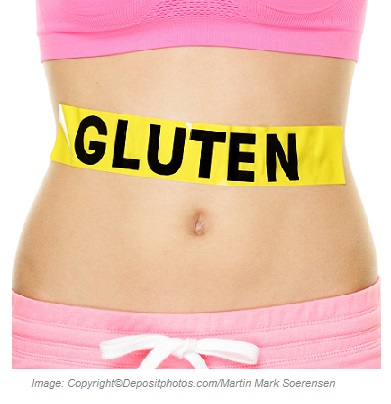 of one or more nutrients.
of one or more nutrients.
Known also as gluten-sensitive enteropathy and nontropical sprue, celiac disease is considered an “iceberg disease”; because only small number of people with celiac disease demonstrates signs and symptoms related to poor absorption, and majority of affected people either have no symptoms or have symptoms not related to poor absorption such as anemia, infertility, decreased bone density, and neurologic symptoms.
The exact cause of celiac disease is not known, though genetic, immunologic, and environmental factors are highly important. There is a clear association between celiac disease and gliadin. It is a component of gluten, a protein found in wheat, barely, and rye.
In susceptible people, exposure to gliadin causes immunologic response, and the immune system produces antibody against gliadin. The antibody cross-reacts with small intestine tissues, leading to inflammation and blunting of the intestinal villi that are responsible for absorption.
Signs and symptoms of celiac disease vary, and they are diarrhea, weight loss, bloating, anemia, hair loss, bulky and foul-smelling stool with high amount of fat (steatorrhea), muscle wasting, and poor growth.
Celiac disease is associated with few medical conditions such as dermatitis herpetiformis (DH), Down syndrome, Turner`s syndrome, IgA deficiency, and diabetes mellitus type I. People with celiac disease are at greater risk of developing gastrointestinal cancer and intestinal lymphoma.
Nutritional Supports:
Restricted Foods:
- Gluten-containing foods: wheat, rye, barley, couscous, spelt, kamut, semolina, triticale, and oats.
- Foods with potentially hidden sources of gliadin: soy sauce, cereals, commercial soups, ice creams, beer, malt, and alcoholic beverages such as whiskey, vodka, and wines.
- Saturated fats.
- Sugars and sweets.
- Processed foods.
- Carbonated beverages.
- Allergenic foods.
- Cheese.
- Cow`s milk.
- Alcohol.
Recommended Foods:
- Water: at least 2 liters a day.
- Gluten free foods: amaranth, arrowroot, corn, buckwheat, rice, potatoes, millet, quinoa, and teff.
- Soy.
- Legumes.
- Nuts.
- Lean protein: fish, chicken, turkey, and beef.
- Fresh fruits and vegetables.
- Foods high in Omega-3: fish, flaxseeds, chai, hemps, and walnuts.
- Foods high in flavonoids and polyphenols: berries.
- Pineapple.
- Ginger.
- Turmeric.
- Green tea.
- Chamomile tea.
Recommended Supplements:
- Digestive Enzymes: A full spectrum product.
- Probiotics: a product that provides minimum 5 to 10 billion organisms per serving.
- Folic Acid: 1 mg a day on an empty stomach.
- Omega – 3 Fatty Acids: 1 – 2 grams a day. They reduce inflammation.
- French Maritime Pine Bark Extract: 200 – 300 mg a day. It is a potent antioxidant that reduces inflammation and improves blood circulation.
- Grape Seed Extract: 50 – 100 mg a day.
- Aloe Vera Juice: ¼ – ½ cup three times a day. Aloe Vera has a healing effect and provides many nutrients.
- Calcium: 1000 mg a day.
- Vitamin D: 2000 – 5000 IU a day.
- Vitamin K2 (as MK-7): 50 – 100 mcg a day. This vitamin has a key role in utilization of calcium and strengthening the bones.
- Magnesium: 200 – 400 mg a day.
- Multivitamins – Multiminerals: A high potency product.

